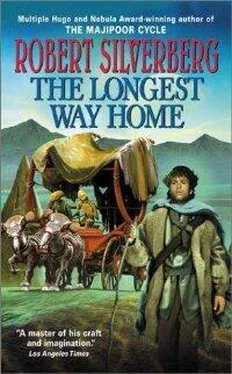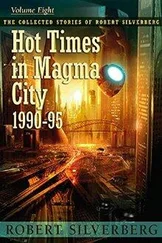There was a vast, resounding quietude here. It was not hard to think of himself as being all alone in the world. No family, no friends, not even any enemies; no Masters, no Folk, no Indigenes, no noctambulos, nothing, no one: only Joseph, Joseph, Joseph, Joseph all alone, walking ever onward through this empty land. It was completely new to him, this solitary kind of life. He could not say that he disliked it. There was a strange music to it, a kind of poetry, that fascinated him. Such great isolation had a mysterious purity and simplicity of form.
Despite the increasing bleakness of the landscape, Joseph moved through his first hours in it in an easy, almost automatic way. He barely took notice of its growing harshness, or of the growing weariness of his legs; his mind was still occupied fully with thoughts of Thayle. He thought not only of the warmth of her embrace, the smoothness of her skin, the touch of her lips against his, and the wondrous sensations that swept through him as he slid deep within her, but also of their discussions afterward, the things she had said to him, the things she had forced him to think about for the first time in his life.
He had always assumed—unquestioningly—that there was nothing remarkable about his being a member of the ruling class by mere right of birth. That was simply how things were in the world: either you were a Master or you were not, and it had been his luck to be born not only a Master but a Master among Masters, the heir to one of the greatest of the Great Houses. “Why are you a Master?” Thayle had asked him. “What right except right of conquest allows you to rule over other people?” Those were not things that one asked oneself, ordinarily. One took them for granted. One regarded one’s rank in life as a matter of having been endowed by a stroke of fate with certain great privilege in return for a willingness to shoulder certain great responsibilities, and the inquiry stopped there. “You are Joseph Master Keilloran,” they had told him as soon as he was old enough to understand that he had such a thing as a name and a rank. “Those people are the Folk. You are a Master.” And then he had devoted the succeeding years of his boyhood to the study of the things he would have to know when he came—by inheritance alone, by simple right of birth—into the duties of the rank for which destiny had chosen him.
Out here everything was different. The identity that had been automatically his from the hour of his coming into the world had been taken from him. For these past months he had been only what he could make of himself—first a fugitive boy searching frantically for safety and gladly accepting the aid that a passing noctambulo offered him; then a valued tribal healer and the friend, no less, of an Indigene chieftain; then a fugitive again, a pathetic one, living along the desperate borderlands of starvation; then the welcome guest of a Folkish family who nursed him back to health as though he were of their own blood, and the lover, even, of the girl of that family. And now he was a fugitive again. He was created anew every day out of the context of that day.
How upside-down everything has become, Joseph thought. At home I never had to worry about where my next meal would come from, but I was aware constantly that when I grew up and succeeded my father I would have to bear the enormous responsibilities of running a Great House—instructing the overseers on what needed to be done, and by whom, and checking the account books, and looking after the needs of the Folk of my House, and many such things like that. Out here there are no responsibilities to think about, but there is no assurance that I will have anything to eat the day after tomorrow, either.
It was a dizzying business. There once had been a time when his life had been all certainty; now it was a thing of perpetual flux. Yet he did not really regret the transformations that had been worked upon him. He doubted that many Masters had been through experiences such as he had had on this journey. He had had to cope with unexpected physical pain and with severe bodily privation. His stay among the Indigenes and his conversations with the Ardardin had taught him things about that race, and the relationship of the Masters to it, that would stand him in good stead once he returned to civilization. Likewise his time at Eysar Haven, both the things he had learned in Thayle’s eager arms and the things she had forced him to confront as they lay side by side quietly talking afterward. All that had been tremendously valuable, in its way. But it will have been a mere waste, Joseph told himself, if I do not survive to return to House Keilloran.
Darkness came. He found a place to sleep, a hollow at the side of a little hill. It would do. He looked back nostalgically to his bed at Eysar Haven, but he was amazed how quickly he could become accustomed to sleeping in the open again. Lie down in the softest place you can find, though it is not necessarily soft, curl into your usual sleeping position, close your eyes, wait for oblivion—that was all there was to it. A hard day’s walking had left him ready for a night’s deep sleep.
In the morning, though, his legs ached all the way up to his skull, and he was aching from the effects of Grovin’s blows, besides. Not for another two days would any of that aching cease and his muscles begin to turn to iron again. But then Joseph felt himself beginning to regain the hardness that had earlier been his and before long he felt ready to walk on and on, forever if need be, to Helikis and beyond, clear off the edge of the world and out to the moons.
The road he had been following veered sharply left, vanishing in the east, a dark dwindling line. He let it go. South is my direction, Joseph thought. He did not care what lay in the east. And he needed no road: one step at a time, through glade and valley, past hill and dale, would take him where he wanted to go.
As the food Thayle had given him dwindled toward its end, he began to think more seriously about the newest metamorphosis in his steady sequence of reinvention, the one that must transform him into a hunter who lived off the land, killing for his food.
Though he was traveling now through a harder, more challenging environment than any he had encountered before, it was by no means an empty one. Wherever he looked he saw an abundance of wild animals, strange beasts both large and small, living as they had lived for millions of years in this unaccommodating land for which neither Masters nor Folk nor Indigenes had found any use. In a glade of spiky gray trees he saw a troop of long-necked red-striped browsing beasts that must have been thirty feet tall, munching on the twisted thorny leaves. They looked down at him with sad, gentle gray eyes that betrayed little sign of intelligence. A brackish lake contained a population of round shaggy wading animals that set up a rhythmic slapping of the surface of the water with their flat, blunt, hairless tails, perhaps because they were annoyed by his presence, as he passed them by. There was a squat, heavy, ganuille-like beast with an incongruous nest of blunt horns sprouting above its nostrils, and small, frisky, stiff-tailed tawny animals with dainty, fragile legs, and slow-moving big-headed browsers nibbling on the unpromising saw-edged reddish grass that grew here, and paunchy, jowly, furry creatures with ominous crests of spikes along their spines, creatures that walked upright and, judging by the way they paused in their wanderings to contemplate the stranger in their midst, might very well be at the same level of mental ability as the poriphars, or even beyond it.
Joseph knew that he would have to kill some of these creatures in order to survive. The noctambulo was not here now to do his hunting for him. Nor were there any streams conveniently provided with mud-crawlers, or with those tasty white tubers he remembered from his earliest days on the run, and it was not very likely that he would be able to find any of the small scrabbling creatures the noctambulo had so easily snatched up with quick swipes of its scooplike paws.
Читать дальше












